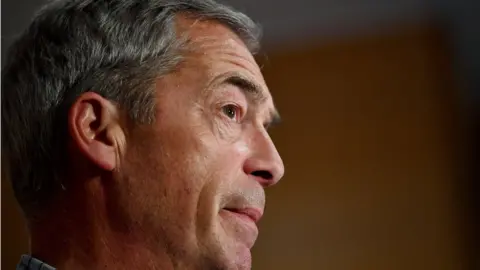Nigel Farage: Coutts document 'shows bank account shut over my views'
 EPA
EPANigel Farage says he has evidence that Coutts bank decided to close his account because his views "do not align" with their values.
Writing in the Telegraph, he said he had gained access to a report by the bank's wealth reputational risk committee via a subject access request.
The BBC previously reported that his account was being closed because he fell below the financial threshold.
Coutts said decisions to close accounts included reputational considerations.
In the Telegraph article, former UKIP leader Mr Farage says that the "36-page" document shows that he was targeted "on personal and political grounds".
According to what the Telegraph says are minutes of a meeting of Coutts' wealth reputational risk committee held on November 17 2022, they read: "The committee did not think continuing to bank NF [Nigel Farage] was compatible with Coutts given his publicly-stated views that were at odds with our position as an inclusive organisation.
"This was not a political decision but one centred around inclusivity and purpose."
He also said there was a perception that he was regarded as "racist and xenophobic", which he called an "appalling slur".
The BBC has not seen the document.
In a video posted to his Twitter account, Mr Farage said he put in a subject access request because he wanted to establish the reason "behind them closing the account".
He said it read like "a brief that you could give to a barrister ahead of a serious criminal trial", and made several references to Brexit and Russia.
He added that the document said that closing his accounts for financial reasons was not justified because his "economic contribution is now sufficient to retain on a commercial basis".
Coutts said: "Our ability to respond is restricted by our obligations of client confidentiality.
"Decisions to close accounts are not taken lightly and take into account a number of factors including commercial viability, reputational considerations, and legal and regulatory requirements."
Last month, Mr Farage went public with the fact that his account was being shut, and said he believed it was for political reasons. He later said he had been turned down by nine other lenders.
But people familiar with Coutts' move subsequently told the BBC it was a "commercial decision", and that the criteria for holding an account with the bank "are clear from the bank's website".
Coutts requires its customers to borrow or invest at least £1m with the bank or hold £3m in savings.
The Financial Times reported that Mr Farage had reduced his business with the bank below its financial eligibility criteria.
In response, Mr Farage did not dispute the fact he did not meet Coutts' threshold, but added that the bank had not had a problem with it for the last 10 years.
He later tweeted that at "no point" had Coutts given him a minimum threshold.
Amid the row, Andrew Griffith, economic secretary to the Treasury, wrote a letter to the Financial Conduct Authority calling for a review in to whether banks are closing accounts of those who are "politically exposed".
Someone classed as a politically exposed person, or PEP, generally presents a higher risk for financial institutions as their position makes them potentially vulnerable to bribery or corruption.
Mr Griffith said that while he recognised the importance of measures taken to prevent money laundering, "it is crucial that an appropriate balance is struck" so that elected officials and their families can access banking services.
